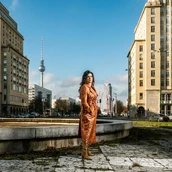
In his final, unfinished opera, Turandot, Giacomo Puccini embraces the visual language of the emerging medium of film – a late work that, both musically and thematically, marks the dawn of a new era.
Director Lorenzo Fioroni sets the action in a timeless fantasy state reminiscent of modern dictatorships, and in his production builds a bridge between the oppressed, sensation-hungry opera-goers and contemporary media consumers.
At the center is the cruel Princess Turandot, who secures her power through a deadly game of riddles. Only Calaf, himself the heir to a despotic system, breaks the cycle – not to bring peace, but to continue it in a new form. Fioroni's interpretation presents two characters whose passionate connection leads less to redemption than to an escalation of violence.
- Conductor: Daniel Carter
- Director: Lorenzo Fioroni
- Starring: Anna Pirozzi / Catherine Foster, Angelo Villari / SeokJong Baek, Nina Solodovnikova / Maria Motolygina, among others
- Duration: Approx. 2 hours 30 minutes / One intermission
- In Italian with German and English subtitles
About the play
A society is terrorized by a princess. Turandot, a beautiful and fascinating representative of an inherited system of power, performs the ritual of terror. Only her marriage promises an end to the violence, but none of the candidates succeeds in fulfilling the condition or solving her riddles. The same spectacle repeats itself again and again, ending with a new execution.
Calaf, the son of a displaced ruler from a foreign land, breaks this pattern against all expectations. He answers the questions and increases his triumph by reversing the balance of power, prolonging the gruesome riddle, and asking the princess a counter-question. In his early sixties, Puccini wants to break new ground once again. The world is in upheaval, a profound transformation is taking place in the arts, and new, more abstract forms are emerging for expressing contemporary experiences.
As the basis for the opera on which Puccini worked during the last four years of his life, he chose TURANDOT, a subject based on a fairy tale by Carlo Gozzi (1762). Despite the exotic sounds of his richest score, filled with the harshest dissonances, what unfolds in TURANDOT is not the cosmos of a doll-like, cute China, but a world permeated by an atmosphere of unfathomable cruelty.
The resolution of the drama became an insurmountable obstacle for Puccini. Always suspicious of happy endings in his operas, he was unable to escape the impasse into which Liù's sacrificial death and the impending reunion of Turandot and Calaf had led him. The question of what basis these two could develop common ground remained unanswered.
Puccini was both deeply fascinated and reluctant to appoint the idea of all-encompassing love as the instrument of salvation that overcomes all adversity, so much so that he was unable to portray this utopia. When he died in 1924, he left behind a fragment. The Ricordi publishing house commissioned the composer Franco Alfano to complete the opera based on Puccini's sketches.
About the Production
Lorenzo Fioroni's production presents the story in a fairytale-like, timeless fantasy state that nevertheless evokes associations with contemporary military dictatorships. The scenes of interrogation and execution play a key role here, evoking a ritual, almost sacred, function of violence.
Contrary to this, the people and the ruling caste repeatedly express their desire for an end to oppression and a comprehensive reconciliation. Calaf and Turandot meet in this field of tension between rule by force and the longing for love. But instead of pacifying social conditions, the couple ushers in a new phase of terror in the finale.
Fioroni explores the psychological makeup of the main characters and finds in both a pronounced propensity for violence. Calaf, too, comes from a despotic ruling family and, by allowing Liù's sacrifice, demonstrates his willingness to step over dead bodies for his pride and his goals. Thus, the bond he ultimately forms with Turandot becomes plausible precisely because of this shared ruthlessness. As a result, passionate love finally expresses itself not in a reversal of the cold-blooded system, but in a prolongation of fear and terror.
Additional information
Dramma lyrico in three actsLibretto by Giuseppe Adami and Renato Simoni, after the play by Carlo Gozzi
First performed on 25th April 1929 in Milan
Premiered at the Deutsche Oper Berlin on 13th September 2008
Pre-performance lecture (in German): 45 minutes prior to each performance
First performed on 25th April 1929 in Milan
Premiered at the Deutsche Oper Berlin on 13th September 2008
Pre-performance lecture (in German): 45 minutes prior to each performance
Participating artists
Daniel Carter (Musikalische Leitung)
Lorenzo Fioroni (Inszenierung)
Paul Zoller (Bühne)
Katharina Gault (Kostüme)
Jeremy Bines (Chöre)
Christian Lindhorst (Kinderchor)
Catherine Foster (Turandot)
Burkhard Ulrich (Altoum)
Angelo Villari (Calaf)
Nina Solodovnikova (Liù)
Volodymyr Morozov (Timur)
Michael Bachtadze (Ping)
Kangyoon Shine Lee (Pang)
Thomas Cilluffo (Pong)
Byung Gil Kim (Ein Mandarin)
Gyumi Park (Erste Damenstimme)
Asahi Wada (Zweite Damenstimme)
Chor der Deutschen Oper Berlin (Chöre)
Kinderchor der Deutschen Oper Berlin (Chöre)
Orchester der Deutschen Oper Berlin (Orchester)
Dates
June 2026
| Mo | Tu | We | Th | Fr | Sa | Su |
|---|---|---|---|---|---|---|
1
|
2
|
3
|
4
|
5
|
6
|
7
|
8
|
9
|
10
|
11
|
12
|
13
|
14
|
15
|
16
|
17
|
18
|
19
|
20
|
21
|
22
|
23
|
24
|
25
|
26
|
27
|
28
|
29
|
30
|






















































